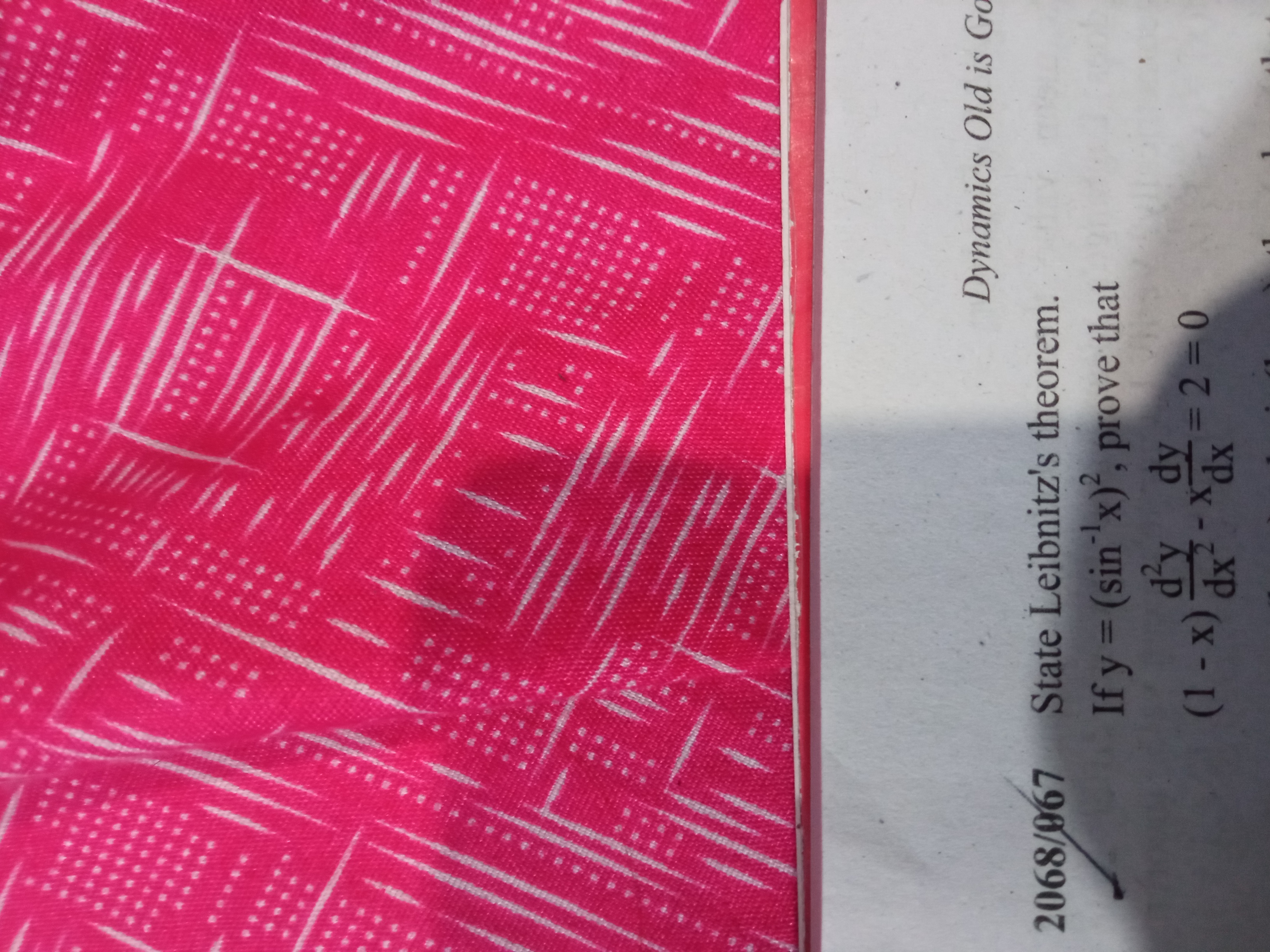State Leibniz's theorem. If y = (sin⁻¹x)², prove that (1-x²) * (d²y/dx²) - x * (dy/dx) = 2.

Understand the Problem
The question is asking to state Leibniz's theorem and then given a function y = (sin⁻¹x)², to prove the differential equation (1-x²) * (d²y/dx²) - x * (dy/dx) = 2.
Answer
Leibniz's Theorem: $$ \frac{d^n (uv)}{dx^n} = \sum_{k=0}^{n} \binom{n}{k} \frac{d^{n-k} u}{dx^{n-k}} \frac{d^k v}{dx^k} $$ Given $y = (\sin^{-1}x)^2$, then $(1-x^2)\frac{d^2y}{dx^2} - x\frac{dy}{dx} = 2$.
Answer for screen readers
Leibniz's Theorem: If $u$ and $v$ are functions of $x$, then $$ \frac{d^n (uv)}{dx^n} = \sum_{k=0}^{n} \binom{n}{k} \frac{d^{n-k} u}{dx^{n-k}} \frac{d^k v}{dx^k} $$ Given $y = (\sin^{-1}x)^2$, then $$ (1-x^2)\frac{d^2y}{dx^2} - x\frac{dy}{dx} = 2 $$
Steps to Solve
- State Leibniz's Theorem
Leibniz's theorem provides a formula for the $n^{th}$ derivative of the product of two functions. If $u$ and $v$ are functions of $x$, and $y = uv$, then the $n^{th}$ derivative of $y$ with respect to $x$ is given by: $$ \frac{d^n y}{dx^n} = \frac{d^n (uv)}{dx^n} = \sum_{k=0}^{n} \binom{n}{k} \frac{d^{n-k} u}{dx^{n-k}} \frac{d^k v}{dx^k} $$ where $\binom{n}{k} = \frac{n!}{k!(n-k)!}$ are the binomial coefficients.
- Find the first derivative of y
Given $y = (\sin^{-1}x)^2$, we need to find $\frac{dy}{dx}$. Using the chain rule: $$ \frac{dy}{dx} = 2(\sin^{-1}x) \cdot \frac{1}{\sqrt{1-x^2}} $$
- Isolate the square root term and square both sides
Multiply both sides by $\sqrt{1-x^2}$ to get: $$ \sqrt{1-x^2} \frac{dy}{dx} = 2\sin^{-1}x $$ Square both sides: $$ (1-x^2) \left(\frac{dy}{dx}\right)^2 = 4(\sin^{-1}x)^2 = 4y $$
- Find the second derivative
Differentiate both sides with respect to $x$ using the product rule and chain rule: $$ (1-x^2) \cdot 2\frac{dy}{dx}\frac{d^2y}{dx^2} + (-2x)\left(\frac{dy}{dx}\right)^2 = 4\frac{dy}{dx} $$
- Simplify the equation and solve
Divide both sides by $2\frac{dy}{dx}$ (assuming $\frac{dy}{dx} \neq 0$): $$ (1-x^2)\frac{d^2y}{dx^2} - x\frac{dy}{dx} = 2 $$ The differential equation is thus proved.
Leibniz's Theorem: If $u$ and $v$ are functions of $x$, then $$ \frac{d^n (uv)}{dx^n} = \sum_{k=0}^{n} \binom{n}{k} \frac{d^{n-k} u}{dx^{n-k}} \frac{d^k v}{dx^k} $$ Given $y = (\sin^{-1}x)^2$, then $$ (1-x^2)\frac{d^2y}{dx^2} - x\frac{dy}{dx} = 2 $$
More Information
Leibniz's theorem generalizes the product rule to higher order derivatives. The equation we proved relates the first and second derivatives of $y=(\sin^{-1}x)^2$.
Tips
A common mistake is forgetting the chain rule when differentiating $\left(\frac{dy}{dx}\right)^2$ or misapplying the product rule. Another common mistake is to not simplify the equation by dividing by $2\frac{dy}{dx}$, which makes further steps more complicated.
AI-generated content may contain errors. Please verify critical information